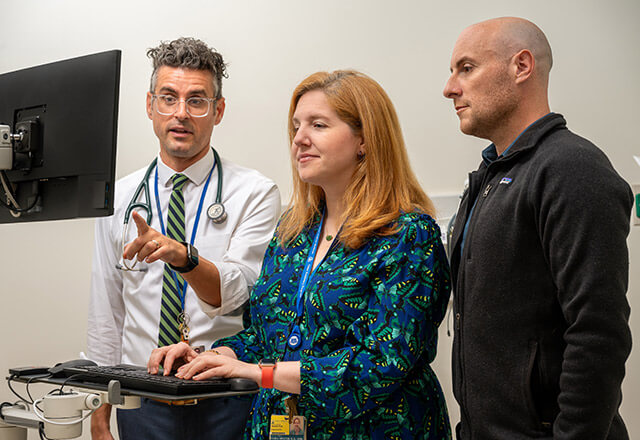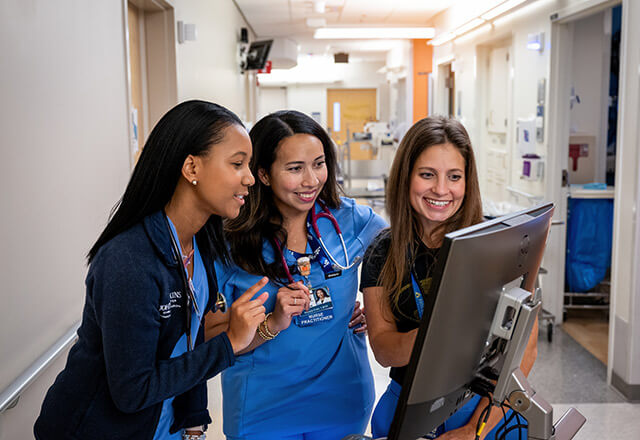Holding It All Together
The complex care team at Johns Hopkins Children’s Center serves as a bridge and a balm for children with complicated conditions who are treated by multiple specialists.

Illustration by Zara Picken
 Complex care team physicians (l to r): Christopher Grybauskas, Sara Mixter, Eric Biondi
Complex care team physicians (l to r): Christopher Grybauskas, Sara Mixter, Eric BiondiKristen Manzueta’s pink cheeks and chubby thighs are testaments to the progress she’s made.
When the little girl was born at The Johns Hopkins Hospital in July 2023, premature at 34 weeks, she didn’t look as healthy. She was diagnosed with a daunting array of conditions: Down syndrome, hypothyroidism, chronic lung disease, a disorder known as choanal atresia that blocks her nasal passages, liver abnormalities and a mutation that increases her risk for cancer.
Kristen required care from pulmonologists, gastroenterologists, oncologists and neurodevelopmental physicians. She also had trouble eating, and needed surgery to install a long-term feeding tube.
Her mother, Amarili Manzueta De La Cruz, didn’t have immediate family in the United States, was holding down a full-time job, was not fluent in English and had to cope with her own fear and exhaustion while caring for her daughter.
“It was overwhelming,” says De La Cruz, speaking with the help of a medical interpreter in a Johns Hopkins Children’s Center exam room after one of Kristen’s many appointments.
When she learned of the difficult road ahead, she says, “I told my baby we would fight together, but it was hard.
“I hugged her and closed my eyes and I thought, ‘God, don’t leave me alone.’”
And she wasn’t alone.
The young family, like about 175 others at Johns Hopkins Children’s Center, gets help and support from a complex care team, formed in 2022 to serve as a bridge and a balm for children who are treated by multiple specialists.
The team of doctors, pediatric-trained nurse practitioners, a pharmacist, a case manager and a program manager do what they can to make life easier for families going through extraordinarily difficult times.
“The complex care team holds it all together,” says Eric Biondi, associate professor of pediatrics. “Their job is to be the trusted partner for the families.”
The team helps families find primary care doctors who are familiar with complex cases; writes letters of medical necessity to insurance companies so patients get the treatments and supplies they need; recommends resources and sometimes just listens.
“We needed somebody to help these kids and families handle not just the medical stuff, but the transitions between specialists and care settings, to recognize the challenges of everyday life,” says Biondi, who joined the Children’s Center in 2017 as its first director of pediatric hospital medicine.
Most of De La Cruz’s family is in the Dominican Republic, though she has a sister in Maryland and her mother came for two weeks, three days after Kristen was born. For months on end, De La Cruz shuffled between work and the hospital, often sleeping in Kristen’s hospital room and going home to Dundalk just to shower.
“We’re a familiar face,” says team member Shanah Szanzer, a nurse practitioner. “Mom knows when she walks in, she’ll see me. I know what Kristen looks like, and how she looks when she’s not doing well. I can help advocate just by knowing her.”
De La Cruz was spending too much money on cabs and ride services, so case manager Lucy Reagan helped her figure out which buses she could take instead. Reagan also helped enroll Kristen in the state’s Rare and Expensive Case Management Program, which provides services such as in-home care for Kristen while her mother is at work.
The team was also able to witness the baby’s in-hospital baptism.
Szanzer likes being part of the solution. “What I really enjoy is getting to know families and being able to see what their goals are, and work toward their goals,” she says.
“The complex care team holds it all together. Their job is to be the trusted partner for the families.”
Dr. Eric Biondi
Many Pieces, One Plan
 Nurse practitioners (l to r): Lajasha Brooks, Micaela Fritz, Shanah Szanzer
Nurse practitioners (l to r): Lajasha Brooks, Micaela Fritz, Shanah SzanzerOn June 18, 2018, Carla Ortiz was driving northbound through Harford County, Maryland, on Interstate Highway 95; her daughter Je’ani (known as Jee), 13 at the time, was in the passenger seat. Carla slowed her Toyota Camry to enter a single-lane construction zone, but the truck behind her did not. It slammed into the car, smashing it and severely injuring mother and daughter.
Jee was flown by helicopter to The Johns Hopkins Hospital, and Carla was transported by ambulance. Carla was treated for broken bones; however, Jee’s injuries were far worse: Her spinal cord was severed at the T7 vertebrae, leaving her with no sensation from her breastbone down and damaging the function of her bladder and bowel.
Surgery likely saved her life, but Jee needed ongoing care.
In 2024, they moved to Maryland from New Jersey to be close to Johns Hopkins, still having three or more medical appointments a week, seeing specialists in neurology, urology, orthopaedics, hematology, psychology, endocrinology, pulmonology, general surgery and wound care.
“Because we work in the hospital, it’s easier for us to get in touch with the specialists, especially with a kid who has a lot of things happening at once.”
Shanah Szanzer
In addition, Jee has had several surgeries, some requiring extensive follow-up care. She goes to the Kennedy Krieger Institute for physical and occupational therapy. Jee is transitioning from pediatric to adult care, meaning yet more care teams are involved.
“We have so many problems and so many providers,” says Carla. “It’s a lot of pieces, a lot of voices. We needed to come up with one band, one sound, one plan where everyone was present and accounted for.”
That’s where the complex care team comes in.
“A lot of what we do is talk to the specialists,” says Szanzer. “Because we work in the hospital, it’s easier for us to get in touch with the specialists, especially with a kid who has a lot of things happening at once.
“We hold a lot of team meetings, getting everybody together, and we are the ones who talk most with the family. We learn what’s important to them, and we make sure everybody is hearing their goals.”
Carla describes Szanzer as a bridge. “She is a ball of fire. She listens to our concerns. She communicates with the clinical staff. She chases everyone down to make sure nothing slips through the cracks.”
[About Szanzer] “She listens to our concerns ... She chases everyone down to make sure nothing slips through the cracks.”
Carla Ortiz
A Source of Continuity
Sara Mixter, assistant professor of medicine and pediatrics, is medical director of the Pediatric Complex Care Collaborative, providing medical care along with Biondi and hospitalist Christopher Grybauskas.
In addition to case manager Reagan, the team includes nurse practitioners Szanzer, Micaela Fritz and Lajasha Brooks; office coordinator Paula Gilyard; pharmacist Julie Gibbons and program manager Traci David.
The general criteria for eligibility is that pediatric patients must require care from at least three specialties, and must rely on at least one medical device, such as Kristen’s long-term feeding tube.
“These parents know their kids,” Biondi says. “Before we had the complex care team, they had to constantly advocate and teach about them. We see the parents relax a little bit more now. They know that someone has their back.”
For the first few months of Kristen’s life, she transferred eight separate times between the NICU, pediatric unit and the Kennedy Krieger Institute, before finally going home on Jan. 9, 2024.
“Teams change no matter what floor you’re on,” says Mixter. “And on top of that, Kristen was moving back and forth. Think about having to tell your story that many times, and people not knowing all the subtleties of your care. As part of the complex care team, we really work to be a source of continuity for patients and families.”
